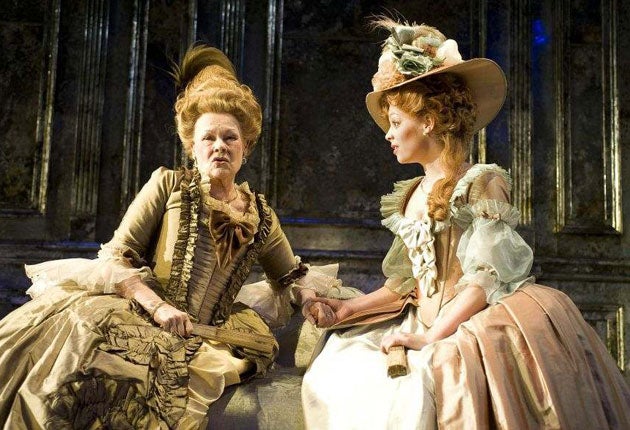First Night: Madame de Sade, Wyndhams Theatre, London
A lovely-looking de Sade – alas for masochistic audiences only

The new show at the Wyndhams looks beautiful, like a moving gallery of portraits by Joshua Reynolds. At one point, Judi Dench convinces you she might be wearing an entire priest's vestiary, bedecked as she is with surplus frocks and surplus surplices, and bits and bobs, and a wig that might have walked off the shelf at a Crufts bring and buy sale.
Mind you, that vestiary was probably a bestiary, too, as Dame Judi is the troubled mother-in-law of the Marquis de Sade, libertine, blasphemer and pamphleteer condemned to death for poisoning and sodomy – he'd get an Arts Council grant these days – as the play opens in 1772.
Ah, the eighteenth century, what larks back then. This rather static, philosophical play about the revolutionary's wife – played by Bond girl Rosamund Pike, finally slamming the door in the old rascal's face when he's let out of Charenton in 1790 – is written by Japanese novelist Yukio Mishima who disembowelled himself in 1970.
It's done the European rounds since its premiere in 1965 but this is the first British performance, in a translation by Donald Keene, and a production by Michael Grandage – the third in the Donmar West End season supported by United House – that doesn't persuade me it's long overdue.
De Sade's womenfolk, all six of them, assemble like a row of powdered duchesses (except for Jenny Galloway's truculent, blockish maidservant, Charlotte) in a Paris mansion designed by Christopher Oram as a mottled, silver corridor of sense and sensibility: the place belongs to Dame Judi's Madame de Montreuil who, like her daughters, Pike's Madame de Sade and Fiona Button's younger sister Anne, are historical characters.
The others are hysterical characters, fictional inventions: Frances Barber's Comtesse de Saint-Ford, swishing a riding crop and alluding to various Black Mass practices, with her body as an altar; and a sly nun, Baronesse de Simiane, beautifully done by Deborah Findlay as an authorised passport to secular pleasures in a contained religious environment.
Trouble is, none of this – or rather nun of this – gets us anywhere. There's an awful lot of speechifying by Rosamund Pike, going on about the Marquis' pornographic novel Justine (oh, for a few quotes or, better still, re-enacted scenes) who is technically under-equipped to deal with it and so begins to resemble one of those talking, squawking heads on a seaside pier game show, two bob a coconut.
Thirty years ago the Glasgow Citizens produced two wonderful shows by Robert David MacDonald about Sadean induction into libertinage and philosophical argument in a castle of torture that reverted to de Sade himself (with a bit of Marivaux thrown in) and illuminated his treatises of freedom and corruption in a brilliant punk Gothic stage language of the day.
The plays were genuinely dangerous and, in one of them, a lascivious duke threatened to drown the world in his demonic sperm before going berserk in a torrent of Nietszchean fury. A transvestite Madame tore off her clothes and danced with the corpse of a lacerated valet. I'm not advocating anything so bold in a show adorned by Dame Judi, but the mild wittering of a few miffed ladies in silk skirts is not much of a substitute.
While the Bastille was stormed from the outside, we are told, the Marquis was breaking down his prison walls from the inside. His campaign to establish a code of evil in a cathedral of vice is represented as a threat to the modern woman. You leave this play wishing he'd had a little more success.
Join our commenting forum
Join thought-provoking conversations, follow other Independent readers and see their replies
Comments
Bookmark popover
Removed from bookmarks